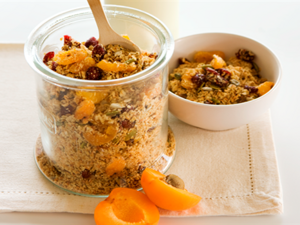
18 Weeks Pregnant - Trimester 2
Lots of leaps and bounds happening in week 18, from nerve cells multiplying to the beginnings of fingerprints.
Your Baby at 18 Weeks
In just one of pregnancy’s incredible facts, by this week your baby has produced most of the billions of brain cells that they will have at birth! Muscles are getting stronger, too, and movements more vigorous, so if you haven’t felt your baby dancing around yet, you should soon. It all depends on the temperament of your baby. Other developments are taking place with their hands - fingers are developing little nails and fingerprints are starting to emerge.
At 18 weeks, your baby is around the size of a mango and you will start to feel them move if you haven't already. They will also be developing their very own fingerprints.
Your Body at 18 Weeks Pregnant
It is quite unbelievable to stroke your belly and know that there is a person growing in there. And when you imagine interacting with this little person – how they will smile, what they will look like – it is quite incredible, isn’t it? Perhaps you know your child’s sex, or maybe you are waiting until their birth to find out. Either way, it’s almost time for the second ultrasound scan. This time, your doctor should be able to tell you whether you’re having a girl or a boy. Don’t be disappointed if you would like to know but nothing can be seen yet. Your child has to be lying “correctly” or even the most practised eye cannot determine their gender.
Diet for Week 18 of Pregnancy
Unfortunately, pregnancy can interfere with normal bowel movements. We can’t stress it enough: a diet rich in fibre, fluid, and moderate activity can help. Fresh or cooked vegetables, fruits, and whole grains, nuts, and legumes can work wonders. Drink enough (approximately 8-10 glasses of fluid per day) to hydrate and facilitate “transit”. Try starting your day with a glass of water or fresh orange or grapefruit juice with the pulp left in. Soak prunes overnight to soften them and enjoy for breakfast with yoghurt – they are natural laxatives that may help with any slow bowel movements. And, continue the walking or other activity you have been doing throughout your pregnancy. If, despite these small tips, your worries persist, talk to your doctor. Above all, do not take over-the-counter medications without consulting your doctor.
Tips for Week 18 of Pregnancy
Calcium-rich foods are important for teeth and bone strength, but what do you do in case of lactose intolerance? You just have to be more creative to get your needs met. A lot of people with lactose intolerance can still continue to eat some hard cheese or yoghurt (some of the lactose is removed as these foods ferment). There are also lactose-free and lactose reduced milks readily available. Besides dairy products, some foods have added calcium, such as some breads and juices; check the food label to be sure. Dark and leafy vegetables, lentils, some dried nuts, and fortified cereals are also sources of calcium – always check the nutrient panel for calcium content.





